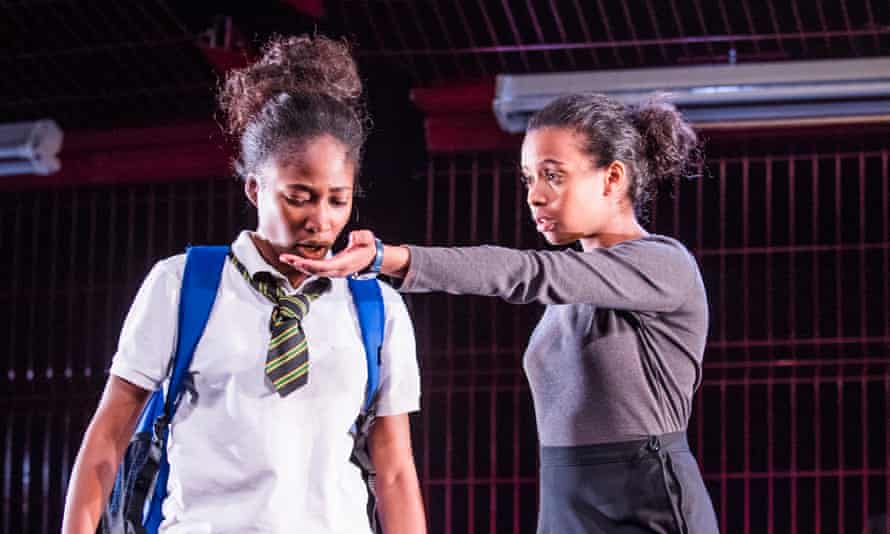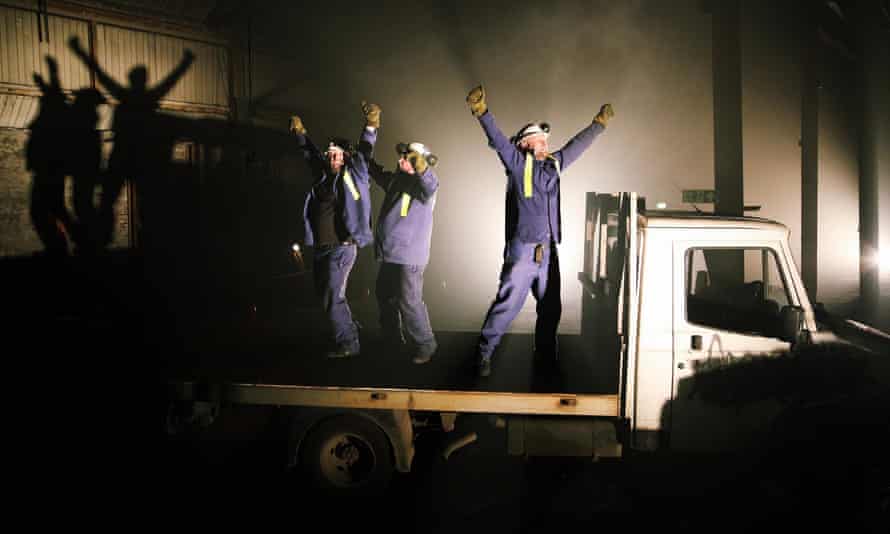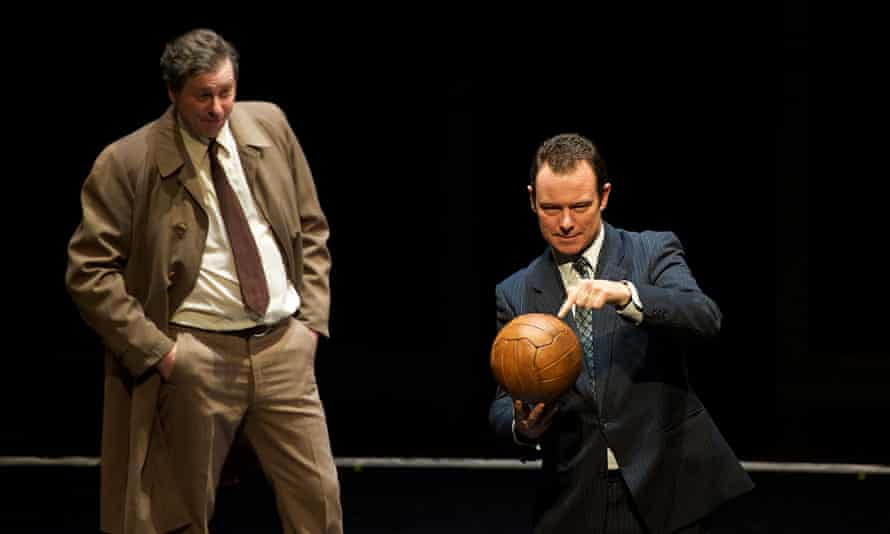what hollywood needs to understand about the working class
I n 1979, giving a talk at Cambridge Academy, the theatre-maker John McGrath insisted that "at that place is a working-form audience for theatre in United kingdom of great britain and northern ireland which makes demands, and which has values, which are different from those enshrined in our idealised middle-course audience". His manifesto for making popular theatre for the working classes, later published every bit A Good Night Out, was hugely influential. Yet almost xl years later, McGrath's ascertainment that the theatre's values are "firmly those of acceptability to a metropolitan middle-class audience" rings as true as ever.
Inside theatre – and within the arts more than broadly – course continues to separate and exclude both artists and audiences. "I call back information technology's embedded and it won't move," says Rhiannon White, co-artistic manager of theatre company Common Wealth and writer of a contempo report on form and the artistic industries. "I think grade is massive; information technology'south at the middle of the profession." The statistics back her up: the Warwick Commission'southward 2015 report institute that the wealthiest, all-time educated and least ethnically diverse 8% of the population were still the most "culturally agile".
This class problem has a long history. Hassan Mahamdallie, who worked on Arts Council England's Artistic Example for Multifariousness, traces discussions almost working-class appointment back to the second world war and the efforts of the Quango for the Encouragement of Music and the Arts (Cema) to take culture beyond the country. After the war, when Cema morphed into the Arts Council, emphasis moved from fine art for the masses to "high art" for a metropolitan few. "I recall what happened was the middle classes rushed into the opening upwards of public subsidy of the arts and very apace came to dominate it," says Mahamdallie. "That process, that trend, has basically been consolidated in the years since."

Theatres today often experience like middle-form enclaves. "I felt my class for the beginning fourth dimension in the theatre," says White. "I felt what information technology meant to exist an outsider, to not take the language, to non feel good plenty in that space." Rod Dixon, creative manager of theatre company Cerise Ladder, says something similar. "I still feel information technology as a working-grade Liverpudlian," he says, "and I've worked in theatre for 35 years." Theatres are spaces in which, as Mahamdallie puts it, "class distinctions are played out".
Common Wealth and Blood-red Ladder counter this past putting working-class experiences, artists and audiences at the centre of their work. "For me it'due south all about language and the power of linguistic communication and who gets to utilize linguistic communication," says White. "Narrative is extremely important, specially when we're talking about class." She'south damning of working-class stories that prove an countless roundabout of drugs, benefit scroungers and domestic violence. "I'm ill of the ascendant narrative being one where we're the baddies or we're the ones that need aid and need saving," she says. "It isn't true. So I guess with my work what I'g trying to do is to turn that dominant narrative into something else."
Cherry Ladder, meanwhile, began as a socialist agit-prop group fifty years ago. Today, a major strand of its work involves taking shows to community venues, post-obit in McGrath'southward footsteps. These non-theatre circuits bring challenges, but the visitor is adamant nigh maintaining artistic quality. "It needs to have high production values," insists Dixon, "because yous're bringing people to the theatre for the first time in their lives. If they accept a second-class experience of it, they're not going to appoint."
Brits accept a reputation for being at once obsessed with, confused by and embarrassed about class. This messy tangle of emotions is perhaps part of the reason why grade is frequently absent from discussions almost diversity in the arts. As Dixon notes, "course is a very difficult thing to ascertain". He identifies as working class, though he's enlightened that his career might lead others to disagree. He adds that "there are a lot of working-class people who do not define themselves equally working-class". White feels a similar tension. "Information technology's hard, because I am function of the system," she pauses to reflect. "Everything's a contradiction."

There's also a lack of discussion in the theatre sector about how class and race intersect. The Bush Theatre'southward artistic managing director, Madani Younis, notes that class has recently re-entered political rhetoric in the wake of the European union referendum. But politicians – and, to an extent, those in the arts – tend to define "working-class" narrowly. "It's become almost a default," says Younis, "that a very well-educated, eye-grade MP doing a Newsnight or a Question Time will say, 'Nosotros've forgotten almost the white working class.' The notion of grade is so rarely used when information technology comes to people of colour – you don't hear it in the same way."
Equally a event, artists of color from working-class backgrounds are doubly excluded. "I was very aware that I was an exception in terms of the spaces I would be in," says Younis. "And that was interesting, because I call back you can experience a bit like an outsider." Playwright and player Charlene James, the daughter of Jamaican immigrants, can identify with that feeling. She jokes that she plays "spot the person of colour" when she is sitting in the theatre, adding "I've always been a minority in the audition".

Worryingly, in that location's a shared sense that things are getting worse rather than better. All the theatre-makers I speak to highlight barriers that have risen even higher since they broke into the manufacture, blaming the slashing of arts education and the hiking of tuition fees under the Conservatives. Labour's recent Interim Upwards inquiry into access in the performing arts gives weight to these fears, finding that audition fees are locking working-class actors out of drama schools.
"I felt similar when I went to drama school information technology was quite an attainable thing to do," James says. "Ten years later, a lot of those people who I went to drama school with probably wouldn't be able to do it. I would never be able to." For those now unable to go to academy or drama school, the points of entry to the manufacture are about not-existent. "There are express pathways," says White. "If you're 19 and on a council estate then you don't know how to become an assistant director job at the National or the Young Vic."
What, and then, needs to modify? The solutions are every bit complex as the bug, just they all circumduct around who is represented, both on stages and on leadership teams. Based on her research, White poses a serial of crucial questions for the cultural sector: "Who programmes the theatres? Are they listening to the communities that are around them? Are they embedded? Are they telling the stories of the city? Are they representing the city on their stages?"
I ask James, whose play Cuttin' Information technology addressed the event of FGM, whether playwrights have a responsibility to tell a wider range of stories. "Definitely," she responds. "A lot of the writers that I know who are writing those stories are from different backgrounds, a different class, but in that location'south merely so much you can practice. You can write as many of those plays as yous can, but then information technology'south downwards to the theatres to put those works on."
Mahamdallie stresses that it'south about more than but giving a platform to working-grade voices. He describes the arts as "the rehearsal of ideas about the possibilities for our future", arguing that working-class audiences are being shut out of that vital process. "So aye, it's near voices," he says, "simply what's the betoken of having working-course voices on the stage just playing to a middle-class audition?"
Though they are wary of what they call a "missionary" mindset when taking theatre into communities, Reddish Ladder and Common Wealth have addressed the trouble by going out to run across working-class audiences in their own spaces, from working men's clubs to battle gyms. Both companies stress the importance of building lasting contact. "The last thing we want to do is exist similar a dipstick," explains Dixon, "to come in, go out and leave them wanting more". Backed past funding from the Paul Hamlyn Foundation, Red Ladder is now exploring how to make these not-theatre touring circuits more sustainable going forward. That means building relationships with local, community-based promoters and touring in a wider range of companies throughout the year.

Similarly, Mutual Wealth's practice is built on the principle of developing long-term relationships with communities, rather than parachuting shows in and out. Their productions are driven past the stories and experiences of the people they work with, from female Muslim boxers in Bradford (No Guts, No Heart, No Glory) to steelworkers in Port Talbot (We're Still Here). "For me, it's bigger than theatre," says White. "Information technology's non but that nosotros're going to drib in and do a testify and so piss off, it's actually seeing these every bit people's lives and people'southward journeys. How can we all be part of the journey to reclaiming our narrative?"
That'south not to say that this approach is necessarily a model for engaging more than working-class audiences with traditional theatre venues. Dixon cautions that shows in working men's clubs and other community venues are not e'er a "gateway drug" to theatre. "It'south not as simple equally, 'Let'south merely take theatre to the masses,'" he says. Theatre buildings are, Dixon argues, "quite impenetrable" for many people – and that'south non going to modify overnight.
For Younis, the basic principle is uncomplicated: "The inside of our building should reflect the outside of our building and vice versa." He makes a brief reference to audience numbers and demographics, merely he's suspicious of purely quantitative approaches. "I really struggle with that shit, because what does that actually mean?" he says. "Does that mean those people have now get core audition members, or does that mean you just had a two-60 minutes date with those people?" The Bush, he insists, is more interested in "depth of experience".

This depth of experience needs to be across theatres' total programmes. While James has noticed an audience engagement drive around shows made by and targeted at specific demographics, she questions whether theatres are serious about sustaining contact with working-class audiences of colour. "What are you doing to follow upwards on that?" she asks. "Are you lot then trying to go them into the other shows, or is it merely the 'black' shows that yous're getting them into?"
It may be that the best thing white, heart-class artistic leaders can exercise is take a step back. "I recall we are at the moment all nodding in understanding that we need to practise more," Younis says, "only I am very excited to hear how nosotros redress that historical, systematic imbalance that has taken place in our sector, because in order for things to change I think some people have to give up power." Mahamdallie agrees. "At the end of the twenty-four hours, information technology'due south near power," he concludes. "And I think the problem that nosotros face is, equally everybody knows, power is not hands given away. Ability has to exist grasped."
The message from all the theatre-makers I speak to is that at that place has to exist major, structural change if the British theatre sector wants to finally address its class trouble. Talk is not enough; at that place needs to exist a seismic shift within the industry. "Imagine if the middle changed," says White. "Then the eye wasn't opera, it was the Creative Case for Multifariousness, or it was community-led functioning. Just imagine what would be different."
Source: https://www.theguardian.com/stage/2018/mar/13/british-theatre-class-problem
0 Response to "what hollywood needs to understand about the working class"
Post a Comment